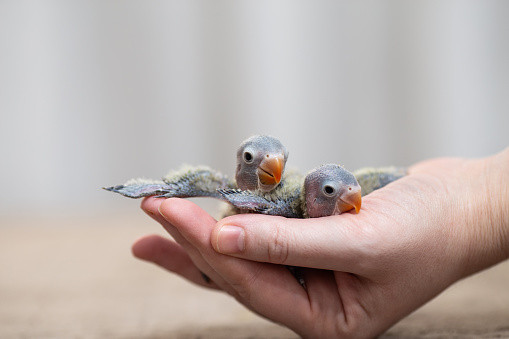
As soon as someone approached the huge cages that had served as their homes since hatching in March, the 24 bright green baby parrots started chattering and bobbing their heads.
The Rare Species Conservatory Foundation is raising the Central American indigenous after they were taken from a smuggler at Miami International Airport.
This 24-hour endeavor includes five hand feedings each day in a room with big cages.
These parrots, which are just 9 weeks old, have already endured a perilous voyage since being taken from their jungle nests.
They have begun the transition from a special formula to a diet of food pellets and fruit now that they are almost completely feathered.
Paul Reillo, a professor at Florida International University and the head of the foundation, asked guests Friday as he took them into a modest structure hidden behind a large home in Loxahatchee, a rural area close to West Palm Beach, "You ready to meet the children?"
"They are hand-raised babies," he said, as the chicks squawked and looked inquisitively at the visitors. "They've never seen mom and dad; they've been raised by us since they hatched."
A U.S. Customs and Border Protection agent noticed the hatchlings at the Miami airport after hearing their feeble chirping inside a carry-on bag, AP News reported.
According to a criminal complaint submitted in U.S. District Court in Miami, the passenger, Szu Ta Wu, had just boarded TACA Airlines flight 392 from Managua, Nicaragua, on March 23, and was changing flights in Miami to return to Taiwan.
Wu was stopped by police at a checkpoint. Reillo later claimed that the object in his backpack was a "sophisticated" temperature-controlled cooler. He was questioned about the noise it was making.
According to the complaint, Wu reached inside and brought out a smaller bag before showing the officer an egg.
The officer then peered inside and saw several eggs as well as a young, small, featherless bird.
According to the complaint, he admitted to the officer that there were 29 eggs and that he lacked the proper paperwork to move the birds.
Wu was detained, and on May 5 he entered a plea of guilty to accusations of bringing birds into the country illegally. When he is sentenced on August 1st, he might spend up to 20 years in jail.
Wu told investigators through a Mandarin translator that a friend had paid for him to go from Taiwan to Nicaragua to pick up the eggs, however court records did not mention a lawyer who could speak on his behalf. He denied having any knowledge of the birds' species. Soon the federal officials reached.
"They didn't know what these things were and wanted my advice on it," Reillo said. Baby parrots are featherless, so it's difficult to property identify them.
In a hasty effort to rescue the now-hatching parrots, he assisted in setting up a temporary incubator at the U.S. Department of Agriculture's aviary at the airport.
The newborn parrots and the rest of the eggs were transported to Reillo's conservatory the next day by Dr. Stacy McFarlane, a USDA veterinarian who had first cared for the birds and eggs at the airport.
"At that point we were off to the races," he said. "We've got all these eggs, the chicks are hatching, the incubator's running and by the time it was all said and done, we hatched 26 of the 29 eggs, and 24 of the 26 chicks survived."
Due to USDA requirements, Reillo and his staff had to clean up while entering and leaving the room since the birds had to be quarantined for 45 days.
However, they were still unsure which of the 360 parrot varieties they were dealing with.
To determine the species, a forensics team from Florida International took DNA samples from the eggshells and the dead birds. The 24 surviving parrots, which comprised two species—the yellow-naped Amazon and the red-lored Amazon—were found to be from eight or nine clutches.
Both birds are well-liked and attractive, which makes them popular in the caged bird and bird trafficking businesses, according to Reillo.
"In fact, the biggest threat to parrots globally is a combination of habitat loss and trafficking," Reillo said, adding that about 90% of eggs are poached for illegal parrot trade.
"Parrots live a long time. They are sentient creatures. They're highly intelligent, very social, and these guys deserve a chance," he said. "The question will be where will they wind up? What is their journey going to be? It's just beginning."
© 2025 Latin Times. All rights reserved. Do not reproduce without permission.




